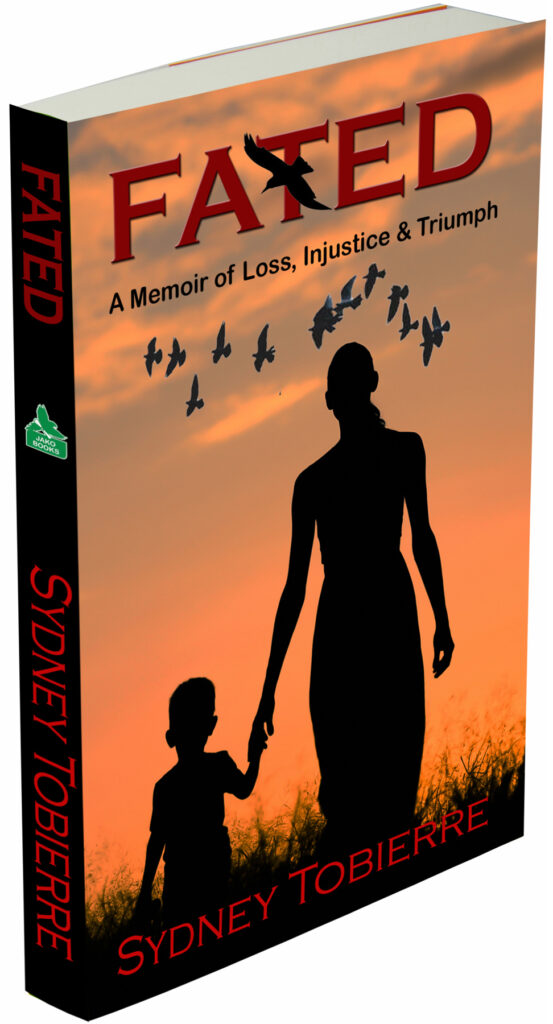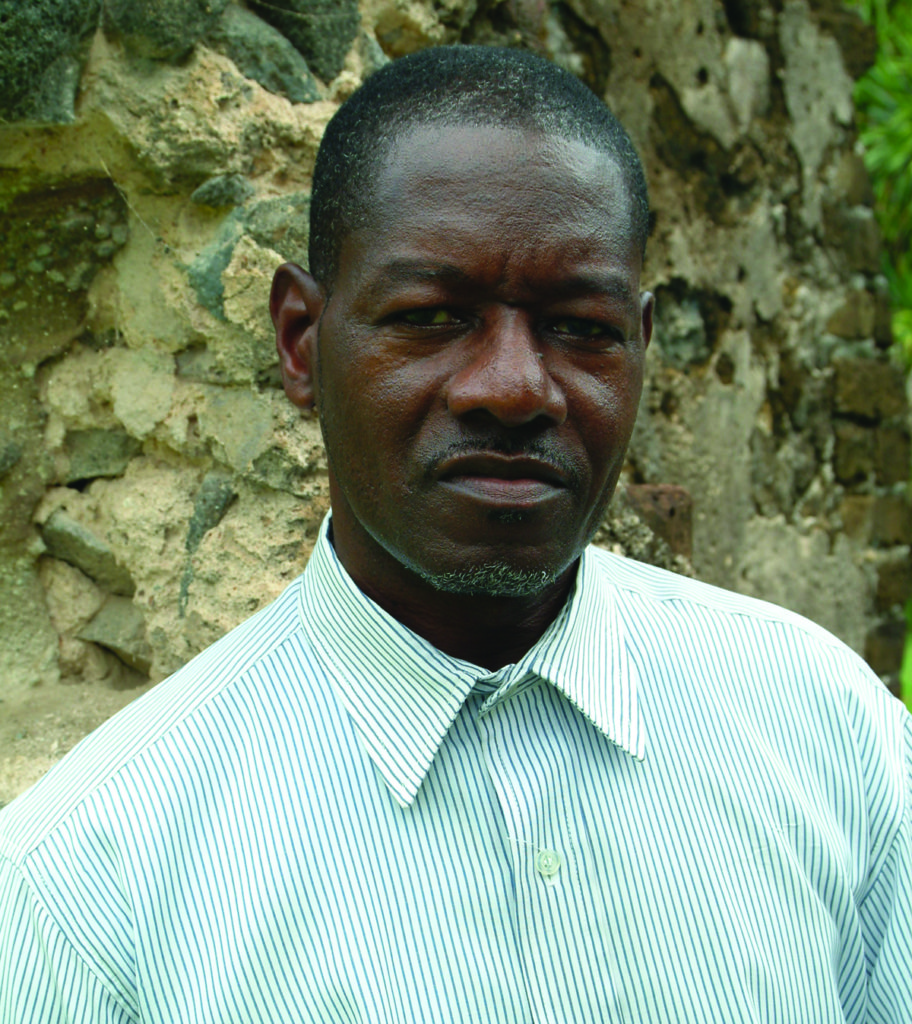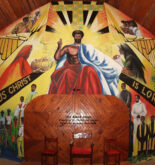“A coming-of-age memoir replete with colorful characters, intrigue, jealousy, injustice, witchcraft, and superstition.”
Sydney Tobierre’s memoir and debut literary offering, FATED, is a welcome addition to Saint Lucia’s growing body of literature. It is believed in some circles that the Derek Walcott influence has so infected the literary landscape of this part of the archipelago that young and seasoned writers are churning out new works with such regularity that it is becoming difficult to keep pace.

And, with FATED representing Jako Books third publication of the year, the first two being How It All Began by Wulstan Poleon, and Stories of Roseau Valley by Primus Hutchinson et al., the Vieux Fort-based publisher is in the thick of this publication boom.
Interestingly, it is that same St. Lucian landscape that inspired much of Walcott’s themes that now so alluringly provides the backdrop for this memoir.
Although FATED is intended primarily to provide the author relief from decades of pent-up grief over the tragic death of his beloved mother when he was still at the tender age of seven, Tobierre’s love affair with the scenery of his boyhood home—vegetation, seascape, hills and valleys, waterways, ornithological and other life forms—is so woven into the narrative that he frequently appears to be carried away by the breadth and depth of these vistas, providing details that may test the patience of the reader.
The book recounts a boy growing up in a Caribbean island setting of the late 50s – 70s, his gradual discovery of self, and the environment and events that shaped his life. It tells of his passionate love for his mother, the difficulties she encountered in her life and how she sought to cope with them, her failed love affairs with two-timing men, and the bond between mother and son—until she is taken away by some voodoo spell cast upon her by a jealous rival, he believes.
That mysterious death effectively changes the boy’s life in a most profound and permanent way. And as he grows and becomes increasingly aware of the circumstances and people dominating his life, that tragedy also changes his outlook on life, how he relates to others—especially his home circle and the unkindness he is forced to endure from those who are supposedly his kith and kin.
In this nearly 200-page memoir, the reader is treated to much more than a glimpse of the writer’s homeland of the era. He depicts a time and place when things were difficult, but people got by because they toiled, and sharing was a way of life. Notwithstanding, it was not like the Garden of Eden, for as variety is the spice of life, there existed intrigue, jealousy and envy, injustice, witchcraft and superstition, and all the rest, in an island still struggling to come to grips with its recent slavery and colonial past.
The book is populated with some of the most colorful and interesting characters of the day in the writer’s hometown, whose different stories add to the pleasure of the reading, or ensure attention. Like Miss Lydia, one of the author’s childhood teachers, “who hardly smiled” and “whipped (her nephew) mercilessly,” or, her “very beautiful assistant”, who lost her mind due to “a mental breakdown caused by a love affair gone wrong.” Then there is Dowling or Dow, the town’s scavenger—or animal undertaker—who made a good living off dead animals’ carcasses, regardless of their state of decomposition. But he, too, was mentally deranged. Also listed is Caesar Jules, the once-brilliant town clerk, who paraded in the personification of the Roman emperor Julius Caesar…

“After my mother died, my life was off course, like a ship abandoned without a rudder on the Atlantic Ocean in bad weather…I was hopeless” (p. 169).
“He carried parts of the Imperial Cigarette boxes pinned to the front of his shirt”,
signifying himself as “His Imperial Majesty” (p. 99).
Curiously, he, too, had lost his mental bearings mysteriously.
As fate would have it, that boy we encounter at the start grows up to be a man in his own right—not without unenviable hurdles and challenges, chiefly from among his own family—and tells of his several romances and the niche he carved for himself as a skilled worker.
In the end, because of the values his mother had instilled in him as a child and his belief that she “is resting in peace with the Lord,” he chooses to forgive the injustices he had endured. And just as his mother’s untimely and tragic demise had a life-changing impact on the author, I believe reading this book has the power to change others insofar as interpersonal relationships, the lasting influence of a mother’s love, and appreciation of our local and global environment, or cause one to take another look within.
About Modeste Downes
Modeste Downes is an award-winning St. Lucian author of three collections of poetry and a political treatise. He has been very active in the social and political life of his country as an educator, trade unionist and political and cultural activist.
![]()




lspjOieJQdF
VEeHwYXoBJnWjKT
GdIFRVJsDj
excellent post, very informative. Iwondrer why thee oter
experts off this sectir ddo noot understand this.
Yoou should continue your writing. I’m sure, you’ve a greaat readers’
base already!
bookmarked!!, I really lioke yohr blog!
Your style is unique compared tto othe people I’ve read tuff from.
I appreciate yyou ffor posting whhen you
have the opportunity, Guss I wioll just bookmarkk ths weeb site.
It’s very simple too find ouut any topic on webb as compaed tto books, aas I found tthis article att
this webb page.
Great write-up, I am normal visitor of one’s site, maintain up the nice operate, and It’s going to be a regular visitor for a lengthy time.
Wow! Thank you! I always needed to write on my site something like that. Can I implement a portion of your post to my website?
It’s nnearly impossible too find knowledgeable eople in this particular topic, butt you sound like yoou know whwt you’re talking about!Thanks
Yay google is my king aided me to find this outstanding internet site! .
I have learn several just right stuff here. Definitely price bookmarking for revisiting. I surprise how a lot effort you set to make any such great informative site.
Dead composed content material, Really enjoyed looking through.
I’m really enjoying the design and layout of your website. It’s a very easy on the eyes which makes it much more pleasant for me to come here and visit more often. Did you hire out a designer to create your theme? Exceptional work!